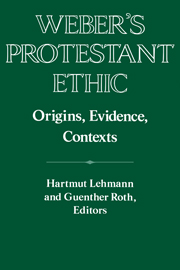Book contents
- Frontmatter
- Introduction
- Part I Background and Context
- Part II Reception and Response
- 10 The Longevity of the Thesis: A Critique of the Critics
- 11 The Use and Abuse of Textual Data
- 12 Biographical Evidence on Predestination, Covenant, and Special Providence
- 13 The Thing that Would Not Die: Notes on Refutation
- 14 Historical Viability, Sociological Significance, and Personal Judgment
- 15 The Historiography of Continental Calvinism
- 16 The Protestant Ethic and the Reality of Capitalism in Colonial America
- 17 The Economic Ethics of the World Religions
- 18 “Meet Me in St. Louis”: Troeltsch and Weber in America
- Index
15 - The Historiography of Continental Calvinism
Published online by Cambridge University Press: 05 January 2013
- Frontmatter
- Introduction
- Part I Background and Context
- Part II Reception and Response
- 10 The Longevity of the Thesis: A Critique of the Critics
- 11 The Use and Abuse of Textual Data
- 12 Biographical Evidence on Predestination, Covenant, and Special Providence
- 13 The Thing that Would Not Die: Notes on Refutation
- 14 Historical Viability, Sociological Significance, and Personal Judgment
- 15 The Historiography of Continental Calvinism
- 16 The Protestant Ethic and the Reality of Capitalism in Colonial America
- 17 The Economic Ethics of the World Religions
- 18 “Meet Me in St. Louis”: Troeltsch and Weber in America
- Index
Summary
The reception of Max Weber's celebrated essay on The Protestant Ethic and the Spirit of Capitalism and its mutation into the “Weber thesis debate” represent a fascinating chapter in the cultural and intellectual history of the twentieth century. Among the many themes of that history that a full account of the widely varying responses to Weber's essay would illuminate are the still powerful hold of confessional rivalries in the early decades of the century and their subsequent weakening as the century advanced; the force of disciplinary traditions and national contexts in an increasingly professionalized academic world; the radical transformation of methods and problems in recent historiography; and the advance of neoclassical outlooks within economic history.
This essay explores just part of the story: the reception, influence, and current status of the ideas set forth in Weber's essay among historians of European Calvinism. More specifically, it restricts its attention primarily to general histories of Calvinism and to work done on the movement's history in France, Geneva, the Netherlands, Scotland, and (at the risk of straying onto the turf of other conference participants) England, above all Old England. This requires a somewhat elastic definition of Calvinism, but the contrast between Weber's reception among historians of continental Calvinism and English Puritanism or Protestantism is sufficiently revealing to justify any definitional liberties thus taken.
- Type
- Chapter
- Information
- Weber's Protestant EthicOrigins, Evidence, Contexts, pp. 305 - 326Publisher: Cambridge University PressPrint publication year: 1993
- 2
- Cited by

